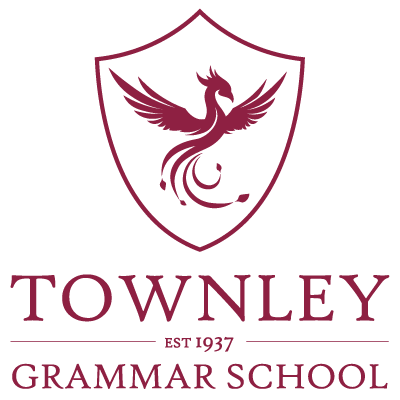Physics
Key Stage 4 Physics (GCSE)
Physics is a compulsory subject for all students; at Townley, we follow the AQA specification 8463.
A total of eight topics of work are covered by the course (four topics in Year 10, four topics in Year 11, with prerequisite work for the larger topics taught in Year 9):
| 1. Energy (Years 9 and 10) | 5. Forces (Years 9 and 10) |
| 2. Electricity (Years 9 and 10) | 6. Waves (Years 9 and 11) |
| 3. Particle Model Of Matter (Years 9 and 11) | 7. Magnetism and Electromagnetism (Year 11) |
| 4. Atomic Physics (Year 10) | 8. Space Physics (Year 11) |
 The specification is designed to give students the tools and concepts they need to be able to construct a scientific approach to solving problems; students will learn to ask and answer questions about the fundamental laws that govern natural phenomena. The course encourages students:
The specification is designed to give students the tools and concepts they need to be able to construct a scientific approach to solving problems; students will learn to ask and answer questions about the fundamental laws that govern natural phenomena. The course encourages students:
- to develop scientific knowledge and conceptual understanding of Physics, including the nature, processes and methods of the subject;
- to learn and apply observational, practical, modelling, enquiry and problem-solving skills, both in and out of the laboratory;
- to develop an ability to evaluate claims based on the subject through critical analysis of the methodology, evidence and conclusions, both qualitatively and quantitatively.
Assessment
At the end of the course, students will sit two examination papers, each counting for 50% of the final grade: each paper lasts 105 minutes and is worth 100 marks.
|
|
Related Careers / A Level Progression
Studying Physics can offer pathways to a wide range of industries including engineering, medicine, telecommunications, energy, nanotechnology, astronomy and space exploration, meteorology and climate change, scientific research, education, plus many more.
Students who study Physics at A-Level or above do not always follow careers directly related to the subject. The problem-solving, mathematical, practical and analytical skills acquired in such a demanding subject are desired in an even broader range of industries, including banking, accountancy, insurance, computing and consultancy. Further information on careers can be found on the Institute Of Physics website: Institute of Physics Website
Key Stage 5 Physics (A Level)
Physics explains how the Universe works in terms of fundamental laws. Physicists can explain and understand everything in the Universe from how stars are formed to why a tennis ball bounces. We study both chaotic and deterministic systems. Physics is everywhere and is used by all of us every day. Our understanding of physics provides us with electricity, it ensures we can build safe buildings, it provides us with tools for medicine and healthcare, it enables us to communicate across the world and beyond. Physics is amazing and fun. Study of physics at A level prepares you for a range of potential careers and courses at university and is fundamental in preparing the next generation of scientists.
At Townley Grammar we study the AQA Physics Specification (7408)
Resources
Physics is taught at Townley Grammar by a team of well qualified and experienced physics subject specialists, who have a strong passion for their subject. Teaching mixes a range of practical, theoretical, research and problem solving approaches to provide students with a range of skills in well-equipped laboratories.
Course Requirements
In order to study physics you need a minimum of a 7 in Physics at GCSE (or a grade 7 in both Core Science and Additional Science GCSE)
Skills
Physics is fundamentally an experimental subject. This course provides numerous opportunities to use practical experiences to link theory to reality, and equip students with the essential practical skills they need. As well as learning about how the universe works, you'll get a broad training in skills that all employers value – an ability to grasp concepts quickly, a determination to find coherent answers, not to mention problem-solving, analytical, mathematical and IT skills.
Even if you don't end up working in a physics-related industry, these skills are still highly regarded. Studying physics is a good way of keeping your options open and earning a good salary.
Assessment Structure
Year 12 Physics Overview
The purpose of this course is to make physics exciting and relevant for everyone, through a selection of contemporary content and a range of delivery modes; it sets physics in a variety of contexts, illustrating connections with everyday life, people, places and cultures; and rewards students for initiative and commitment and allows them to develop their own interests.
This qualification is linear, which means that students will sit all the A-level exams at the end of their A-level course in year 13.
The GCE A level course consists of the following core topics:
- Measurements and their errors;
- Particles and radiation;
- Waves;
- Mechanics and materials;
- Electricity;
Year 13 Physics Overview
In Year 13 students continue their studies following the core topics: 6.1. Further mechanics; 6.2. Thermal physics; 7. Fields and their consequences; 8. Nuclear physics.
In addition there are a range of options. The current Year 13 will mostly be sitting Turning Points for their option.
This qualification is linear, which means that students will sit all the A-level exams at the end of their A-level course in Year 13.
The A level Assessment is via three 2 hour papers
- Paper 1 covers topics 1-6.1;
- Paper 2 covers topics 6.2 – 8, (assuming knowledge of the topics 1 - 6.1). Both papers 1 and 2 carry 85 marks and carry a mixture of long, short and multiple-choice questions.
- Paper 3 examines data handling and practical work in addition to assessing the optional topic. This paper carries 80 marks and is assessed via short and long answer questions.
There is no longer any coursework contributing to the assessment grade; however, practical skills are assessed by teachers (as a separate practical endorsement) and will be reported separately, alongside the qualification grade on your certificate.



